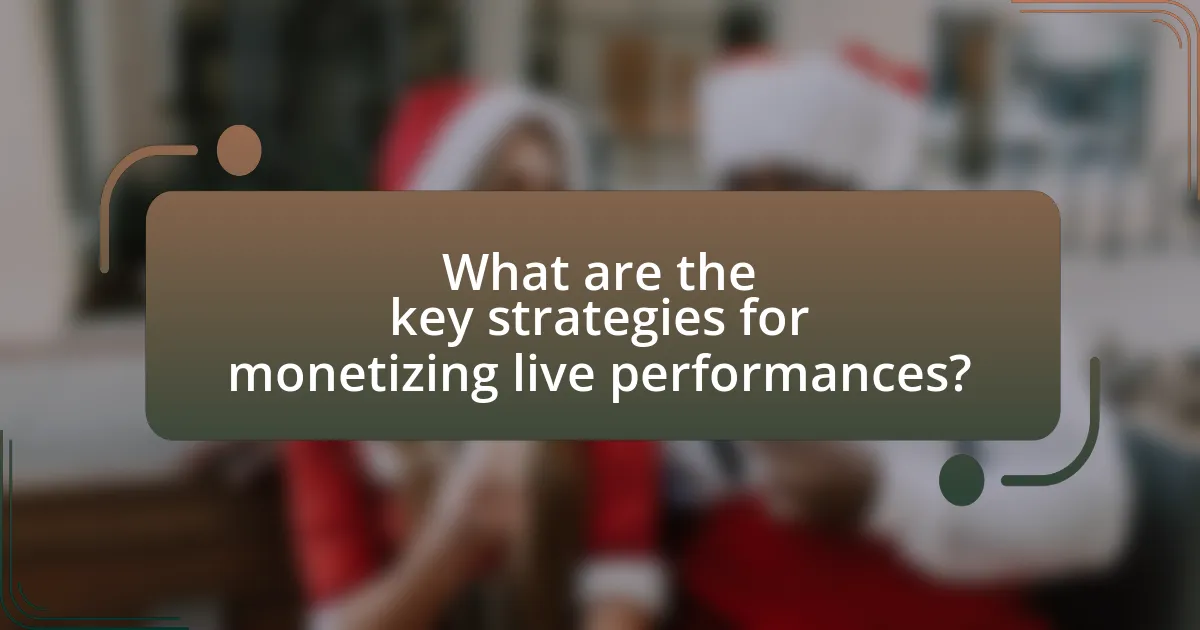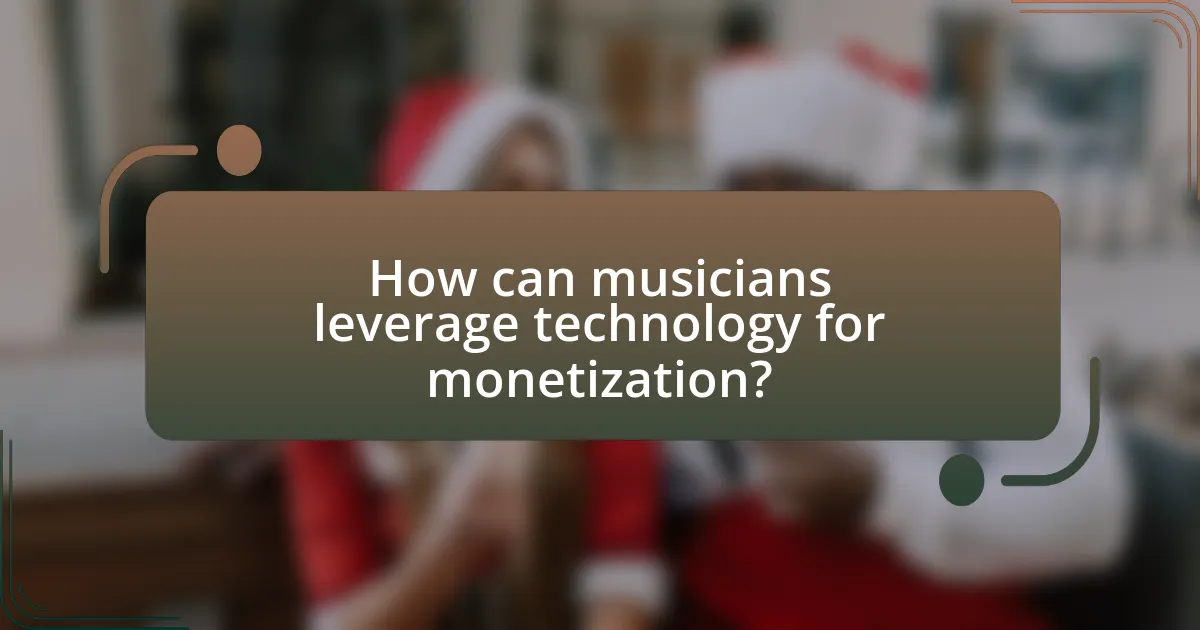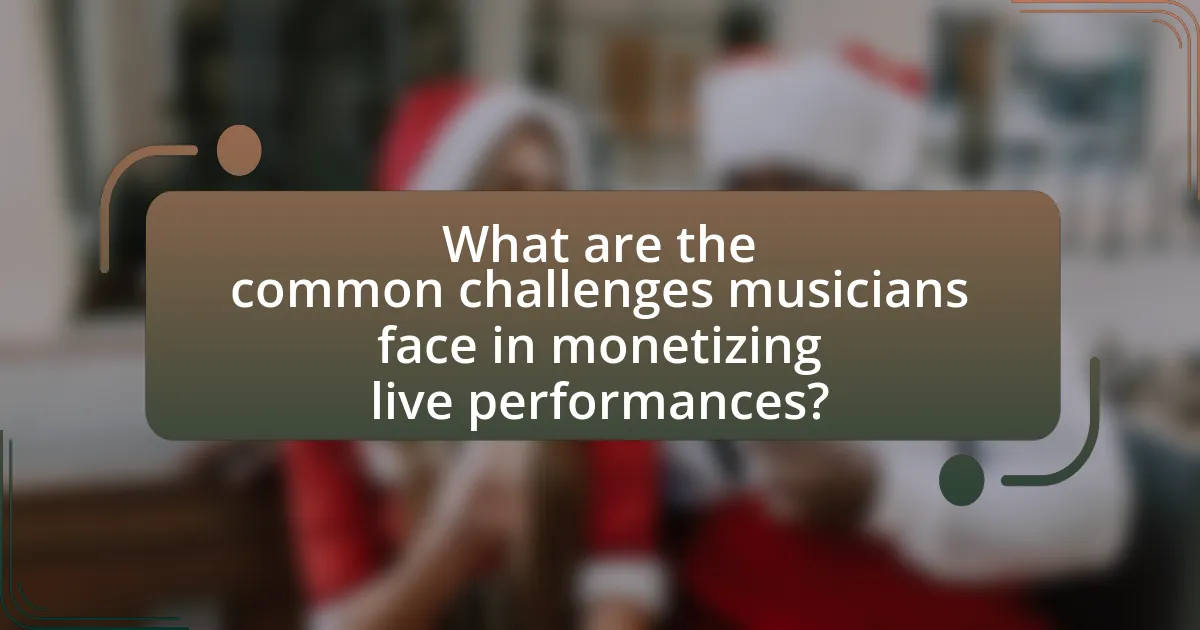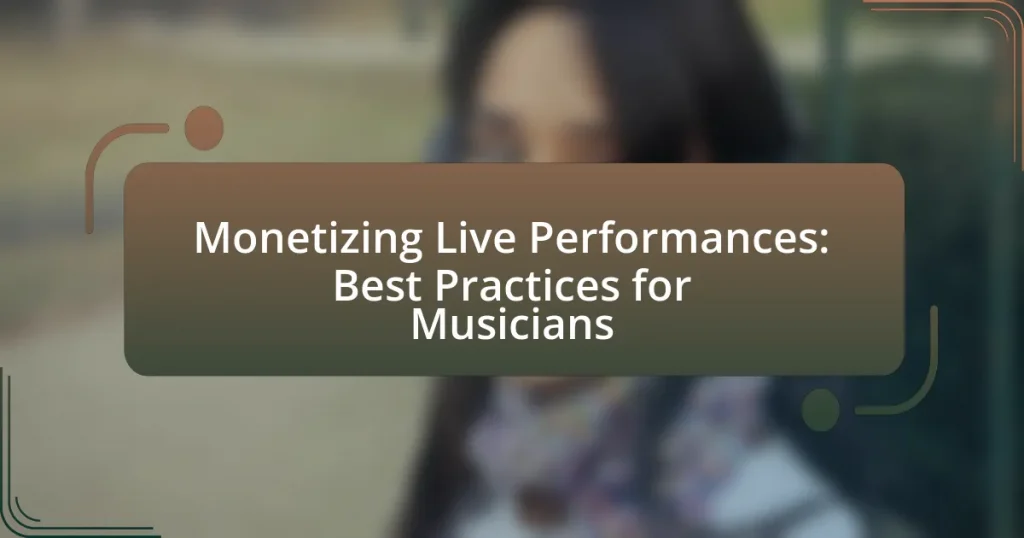The article focuses on monetizing live performances, providing musicians with essential strategies to enhance their revenue. Key topics include effective pricing techniques, the impact of venue selection on ticket pricing, and the importance of audience engagement in driving sales. It also explores the role of merchandise sales, sponsorships, and digital streaming as additional income sources. Furthermore, the article addresses common challenges musicians face, such as financial barriers and competition, while offering best practices for successful live performances and risk management through insurance options. Overall, it serves as a comprehensive guide for musicians seeking to optimize their financial returns from live events.

What are the key strategies for monetizing live performances?
Key strategies for monetizing live performances include ticket sales, merchandise sales, sponsorships, and digital streaming. Ticket sales generate direct revenue, with successful artists often utilizing tiered pricing and VIP packages to maximize earnings. Merchandise sales, such as branded apparel and music, provide additional income and enhance fan engagement. Sponsorships from brands seeking exposure to the artist’s audience can significantly boost revenue, as seen in partnerships during major tours. Digital streaming of live performances on platforms like YouTube or Twitch can also create new revenue streams through ad revenue and viewer donations, reflecting the growing trend of virtual events.
How can musicians effectively price their live performances?
Musicians can effectively price their live performances by analyzing their costs, understanding their target audience, and researching market rates. First, musicians should calculate all expenses associated with the performance, including travel, equipment, and venue fees, to ensure they cover costs. Next, they must consider their audience’s willingness to pay, which can be assessed through previous ticket sales and demographic research. Additionally, musicians should investigate what similar artists charge in their genre and location, as this provides a benchmark for setting competitive prices. According to a survey by the Music Industry Research Association, 70% of musicians who regularly assess their pricing strategy report increased revenue, highlighting the importance of a data-driven approach to pricing.
What factors should be considered when setting ticket prices?
When setting ticket prices, factors such as production costs, market demand, venue capacity, and competitor pricing should be considered. Production costs include expenses for artists, staff, equipment, and venue rental, which directly impact the minimum price needed to break even. Market demand reflects audience interest and willingness to pay, often influenced by the artist’s popularity and the event’s uniqueness. Venue capacity determines the maximum number of tickets available, affecting overall revenue potential. Competitor pricing provides insight into what similar events charge, helping to position the ticket price competitively. These factors collectively ensure that ticket prices are both profitable and appealing to potential attendees.
How do different venues impact pricing strategies?
Different venues significantly impact pricing strategies by influencing factors such as capacity, location, and audience demographics. Larger venues typically allow for lower ticket prices due to higher capacity, while smaller, more intimate venues may necessitate higher prices to cover costs. Additionally, venues in urban areas often command higher prices due to increased demand and accessibility, whereas rural venues may require lower pricing to attract attendees. For instance, a study by the National Endowment for the Arts found that ticket prices vary widely based on venue type, with amphitheaters averaging $50 per ticket compared to $30 for smaller clubs, illustrating how venue characteristics directly affect pricing strategies.
What role does audience engagement play in monetization?
Audience engagement is crucial for monetization as it directly influences revenue generation through ticket sales, merchandise, and sponsorships. Engaged audiences are more likely to attend live performances, resulting in higher ticket sales; for instance, a study by Eventbrite found that 78% of attendees are willing to pay more for an event they feel connected to. Additionally, engaged fans often purchase merchandise and promote events through word-of-mouth, further enhancing revenue streams. Therefore, fostering strong audience engagement not only boosts immediate financial returns but also builds long-term loyalty, which is essential for sustained monetization in the music industry.
How can musicians enhance audience interaction during performances?
Musicians can enhance audience interaction during performances by incorporating call-and-response techniques, engaging storytelling, and utilizing social media platforms for real-time feedback. Call-and-response techniques encourage audience participation, making them feel involved in the performance; for example, artists like Beyoncé often invite the crowd to sing along, creating a communal experience. Engaging storytelling allows musicians to connect emotionally with the audience, as seen in the performances of artists like Taylor Swift, who shares personal anecdotes related to her songs. Additionally, using social media during performances, such as live tweeting or Instagram polls, can foster immediate interaction and feedback, as demonstrated by artists like Chance the Rapper, who actively engages with fans online. These methods not only enhance the live experience but also contribute to building a loyal fan base, ultimately aiding in the monetization of live performances.
What techniques can be used to build a loyal fan base?
To build a loyal fan base, musicians can utilize techniques such as engaging with fans through social media, offering exclusive content, and creating memorable live experiences. Engaging with fans on platforms like Instagram and Twitter fosters a sense of community and connection, which is essential for loyalty. Offering exclusive content, such as behind-the-scenes footage or early access to new music, incentivizes fans to remain invested. Additionally, creating memorable live experiences, such as unique performances or fan meet-and-greets, enhances emotional connections and encourages fans to return. These strategies are supported by research indicating that personal interaction and exclusive offerings significantly increase fan loyalty in the music industry.
What are the benefits of merchandise sales during live performances?
Merchandise sales during live performances provide musicians with significant revenue opportunities and enhance audience engagement. These sales can generate substantial income, with some artists reporting that merchandise can account for up to 30% of their total earnings from a concert. Additionally, selling merchandise allows fans to take home a tangible reminder of the experience, fostering a deeper connection to the artist and their music. This connection can lead to increased loyalty and future ticket sales, as fans are more likely to support artists they feel a personal connection with. Furthermore, merchandise serves as a marketing tool, promoting the artist’s brand and music beyond the event itself, as fans wear or display their purchases in various settings.
What types of merchandise are most appealing to fans?
Apparel, accessories, and exclusive collectibles are the types of merchandise most appealing to fans. Fans often seek items that allow them to express their loyalty and connection to their favorite artists, with clothing like t-shirts and hoodies being particularly popular due to their practicality and visibility. Additionally, accessories such as hats and jewelry serve as personal statements of fandom. Exclusive collectibles, including signed posters and limited edition vinyl records, attract fans who value unique items that enhance their connection to the artist. According to a survey by MusicWatch, 70% of concertgoers reported purchasing merchandise at live events, highlighting the importance of these items in fan engagement and revenue generation for musicians.
How can musicians effectively promote their merchandise at shows?
Musicians can effectively promote their merchandise at shows by creating engaging displays and utilizing social media to generate buzz. An attractive merchandise booth with clear signage and appealing visuals draws attention and encourages purchases. Additionally, musicians can leverage their social media platforms before and during the show to inform fans about available merchandise, special promotions, or limited-time offers, which can increase sales. Research indicates that 70% of concertgoers are likely to purchase merchandise if they are aware of it beforehand, highlighting the importance of pre-show promotion.

How can musicians leverage technology for monetization?
Musicians can leverage technology for monetization by utilizing digital platforms for streaming, merchandise sales, and fan engagement. Streaming services like Spotify and Apple Music allow musicians to earn royalties based on the number of plays, with Spotify alone paying out approximately $0.003 to $0.005 per stream. Additionally, musicians can sell merchandise directly through platforms like Bandcamp or their own websites, which can significantly increase revenue. Social media and crowdfunding platforms, such as Patreon, enable artists to connect with fans and receive direct financial support, with Patreon reporting that creators can earn an average of $3,000 per month from their subscribers. By integrating these technologies, musicians can create diverse income streams and enhance their financial sustainability.
What digital platforms can musicians use to sell tickets?
Musicians can use platforms such as Eventbrite, Ticketmaster, and Bandsintown to sell tickets for their performances. Eventbrite allows artists to create events and manage ticket sales easily, while Ticketmaster is a well-established platform with a broad audience reach. Bandsintown not only helps musicians sell tickets but also promotes their shows to fans who follow them. These platforms are widely recognized in the industry, providing reliable services for ticket sales and event management.
How do online ticketing services compare in terms of fees and features?
Online ticketing services vary significantly in terms of fees and features, with platforms like Eventbrite typically charging a service fee of 2% plus $0.79 per ticket, while Ticketmaster may impose higher fees, often around 15% of the ticket price. Features also differ; for instance, platforms such as Brown Paper Tickets offer a pay-what-you-can model, appealing to budget-conscious consumers, whereas Ticketfly provides advanced promotional tools and analytics for event organizers. These differences highlight the importance of selecting a service that aligns with specific event needs and budget constraints.
What are the advantages of using social media for ticket sales?
Using social media for ticket sales offers significant advantages, including increased reach, targeted marketing, and real-time engagement with potential customers. Social media platforms have billions of active users, allowing musicians to promote events to a vast audience, which can lead to higher ticket sales. Additionally, targeted advertising features enable musicians to reach specific demographics, ensuring that promotional efforts are directed toward individuals most likely to attend their performances. Real-time engagement through comments, shares, and direct messages fosters a sense of community and urgency, encouraging fans to purchase tickets promptly. According to a study by Eventbrite, 62% of event creators reported that social media was their most effective marketing channel for ticket sales, highlighting its effectiveness in driving attendance.
How can streaming services contribute to live performance revenue?
Streaming services can significantly contribute to live performance revenue by increasing artist visibility and engagement with audiences. When artists release music on platforms like Spotify or Apple Music, they reach a broader audience, which can lead to higher ticket sales for live shows. For instance, a study by the Music Industry Research Association found that artists who actively promote their live performances on streaming platforms see an average increase of 20% in ticket sales. Additionally, streaming services often provide data analytics that help artists understand their audience demographics and preferences, allowing for targeted marketing strategies that can enhance attendance at live events.
What are the best practices for live streaming performances?
The best practices for live streaming performances include ensuring high-quality audio and video, engaging with the audience, promoting the event in advance, and utilizing multiple platforms for wider reach. High-quality audio and video are crucial as they significantly enhance the viewer experience; studies show that 70% of viewers abandon streams with poor quality. Engaging with the audience through real-time interaction fosters a sense of community and connection, which can lead to increased viewer retention and potential monetization opportunities. Promoting the event in advance through social media and email campaigns can increase attendance, as research indicates that pre-event marketing can boost viewer numbers by up to 50%. Finally, using multiple streaming platforms, such as YouTube, Facebook Live, and Twitch, maximizes exposure and potential revenue streams, as each platform attracts different audiences.
How can musicians monetize their recorded live performances online?
Musicians can monetize their recorded live performances online by selling digital downloads, streaming on platforms that offer revenue sharing, and utilizing crowdfunding or subscription models. Digital downloads allow musicians to sell high-quality audio files directly to fans, while streaming services like Spotify and Apple Music provide royalties based on the number of streams. Additionally, platforms such as Patreon enable musicians to offer exclusive content to subscribers, creating a steady income stream. According to a 2021 report by the Recording Industry Association of America, streaming accounted for 83% of the U.S. music industry’s revenue, highlighting the potential for musicians to earn through these channels.
What tools can help musicians manage their live performance logistics?
Musicians can effectively manage their live performance logistics using tools such as Eventbrite for ticketing, Google Calendar for scheduling, and Trello for task management. Eventbrite allows musicians to create and sell tickets online, streamlining the ticketing process and providing analytics on sales. Google Calendar helps in organizing rehearsal schedules, performance dates, and coordinating with band members. Trello offers a visual project management system that enables musicians to track tasks related to their performances, such as equipment needs, setlists, and promotional activities. These tools collectively enhance organization and efficiency, which are crucial for successful live performances.
How can scheduling and planning software improve performance efficiency?
Scheduling and planning software can significantly improve performance efficiency by optimizing time management and resource allocation for musicians. This software enables artists to create detailed schedules that align rehearsals, performances, and promotional activities, reducing the likelihood of conflicts and missed opportunities. For instance, a study by the National Endowment for the Arts found that effective scheduling can increase performance attendance by up to 30%, as it allows musicians to better coordinate with venues and audiences. Additionally, such software often includes features for tracking progress and deadlines, which enhances accountability and ensures that all tasks are completed on time, ultimately leading to more polished and successful live performances.
What role does data analytics play in optimizing live shows?
Data analytics plays a crucial role in optimizing live shows by providing insights into audience preferences, ticket sales, and performance metrics. By analyzing data from previous events, musicians and event organizers can identify trends in attendance, pricing strategies, and optimal performance times. For instance, a study by Eventbrite found that events with data-driven marketing strategies saw a 30% increase in ticket sales. This demonstrates that leveraging data analytics not only enhances the planning process but also maximizes revenue potential for live performances.

What are the common challenges musicians face in monetizing live performances?
Musicians commonly face challenges such as low ticket sales, high venue costs, and competition from other entertainment options when monetizing live performances. Low ticket sales can result from inadequate marketing or a lack of audience engagement, leading to reduced revenue. High venue costs, including rental fees and operational expenses, can significantly cut into profits, making it difficult for musicians to break even. Additionally, competition from streaming services and other forms of entertainment can divert potential audiences away from live shows, further complicating the monetization process. These factors collectively hinder musicians’ ability to generate sustainable income from their performances.
How can musicians overcome financial barriers to live performances?
Musicians can overcome financial barriers to live performances by leveraging crowdfunding platforms, securing sponsorships, and utilizing social media for promotion. Crowdfunding allows artists to raise funds directly from fans, with platforms like Kickstarter and Patreon enabling musicians to finance their projects before they occur. Sponsorships from local businesses or brands can provide financial support in exchange for advertising opportunities during performances. Additionally, effective use of social media can enhance visibility and ticket sales, as musicians can engage with their audience and promote events at minimal cost. According to a 2021 survey by the Music Industry Research Association, 60% of musicians reported using crowdfunding successfully to fund their live shows, demonstrating its effectiveness in overcoming financial challenges.
What funding options are available for independent musicians?
Independent musicians have several funding options available to support their projects. These options include crowdfunding platforms like Kickstarter and Indiegogo, which allow artists to raise money directly from fans in exchange for rewards. Additionally, musicians can apply for grants from organizations such as the American Society of Composers, Authors, and Publishers (ASCAP) or the National Endowment for the Arts, which provide financial support for creative projects. Furthermore, independent musicians can seek sponsorships or partnerships with brands that align with their music, offering financial backing in exchange for promotional opportunities. Lastly, musicians can utilize music licensing opportunities, where they earn money by allowing their music to be used in films, commercials, or video games. These funding avenues are essential for independent musicians to sustain and grow their careers.
How can sponsorships help alleviate financial pressures?
Sponsorships can alleviate financial pressures by providing musicians with essential funding and resources to support their live performances. This financial backing can cover costs such as venue rentals, equipment, marketing, and production expenses, which are often significant barriers for artists. For instance, a study by the National Endowment for the Arts found that sponsorships can increase the overall budget of a performance by up to 30%, allowing musicians to invest more in their craft and reach wider audiences. By securing sponsorships, musicians can focus on their artistic endeavors rather than solely on financial constraints, ultimately enhancing their performance quality and audience engagement.
What are the risks associated with live performance monetization?
The risks associated with live performance monetization include financial loss, reputational damage, and legal issues. Financial loss can occur due to low ticket sales, high production costs, or unexpected expenses, which can lead to a negative return on investment. Reputational damage may arise from poor performance quality or negative audience feedback, impacting future opportunities. Legal issues can stem from contract disputes, copyright infringements, or non-compliance with local regulations, which can result in fines or lawsuits. These risks highlight the importance of careful planning and management in the monetization process.
How can musicians protect themselves from potential losses?
Musicians can protect themselves from potential losses by securing comprehensive insurance coverage tailored to their specific needs. This includes liability insurance to cover accidents during performances, equipment insurance to safeguard against theft or damage, and cancellation insurance to mitigate financial losses from event cancellations. According to a survey by the Music Industry Research Association, 70% of musicians reported experiencing financial losses due to unforeseen circumstances, highlighting the importance of these protective measures. By investing in appropriate insurance, musicians can significantly reduce their risk and ensure financial stability in their careers.
What insurance options should musicians consider for live events?
Musicians should consider several insurance options for live events, including general liability insurance, equipment insurance, and event cancellation insurance. General liability insurance protects against claims of bodily injury or property damage that may occur during a performance. Equipment insurance covers loss or damage to musical instruments and gear, which can be costly to replace. Event cancellation insurance provides financial protection in case a performance is canceled due to unforeseen circumstances, such as illness or extreme weather. These insurance types are essential for safeguarding musicians’ financial interests and ensuring smooth live performances.
What are the best practices for ensuring a successful live performance?
The best practices for ensuring a successful live performance include thorough preparation, audience engagement, and effective promotion. Musicians should rehearse extensively to ensure a polished performance, as studies show that well-rehearsed acts receive higher audience satisfaction ratings. Engaging with the audience through interaction and dynamic stage presence can enhance the overall experience, leading to increased merchandise sales and future bookings. Additionally, promoting the event through social media and local marketing strategies can significantly boost attendance, as research indicates that targeted promotions can increase ticket sales by up to 30%.
How can musicians prepare for unexpected challenges during shows?
Musicians can prepare for unexpected challenges during shows by developing a comprehensive contingency plan that includes technical rehearsals, backup equipment, and clear communication protocols. Technical rehearsals allow musicians to identify potential issues with sound, lighting, or staging, enabling them to address these problems before the performance. Having backup equipment, such as extra instruments, microphones, and cables, ensures that technical failures do not disrupt the show. Additionally, establishing clear communication protocols among band members and crew helps facilitate quick responses to any unforeseen circumstances, such as a member falling ill or equipment malfunctioning. These strategies are supported by industry practices, where many successful musicians emphasize the importance of preparation in maintaining performance quality and audience engagement.
What tips can help musicians maximize their revenue from live performances?
Musicians can maximize their revenue from live performances by diversifying their income streams. This includes selling merchandise, offering VIP experiences, and utilizing crowdfunding platforms. For instance, a study by the Music Industry Research Association found that artists who sell merchandise at shows can increase their earnings by up to 30%. Additionally, engaging with fans through social media can enhance ticket sales and promote upcoming shows, leading to higher attendance and revenue. By implementing these strategies, musicians can effectively boost their financial returns from live performances.
